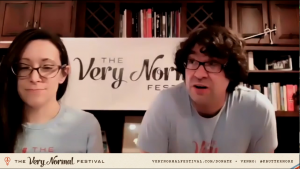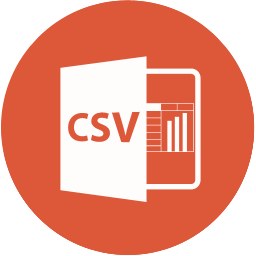If innovation and adaptability are the soul of improv. There are possibly no better personifications of it than Kelly Buttermore and Justin Peters. The creators of From Justin to Kelly, The Very Normal Festival and The Countdown Improv Festival have spent years re-imagining what it is to be performers and teachers, creating conferences and festivals that weren’t carbon copies of the events that already existed around the world. That didn’t stop when our stages had to close their doors last year. Justin and Kelly created new online experiences that went beyond putting their shows on Zoom.
This weekend, they’re putting on a very special and unusual show and fundraiser for the Countdown Festival. I was able to check in with them about the one of a kind festival and fundraiser.
What’s the origin of the name and the festival?
Countdown is unique in many ways, but chief among them is that it’s the only festival in the world devoted exclusively to trio, duo, and solo improv. We’ve been a duo now for 11+ years, and we’re big fans and partisans of small group improv. We like it, in part, because it’s hard. When there’s just a few of you on stage, there’s nowhere to hide, and you’re have to learn pretty quickly how to make your choices work, rather than abandoning them in a panic and retreating to the sidelines to hide out for a few scenes while ruing the day you ever signed up for improv class. Anyway, we were inspired back in 2017 to found a festival that put small groups front and center. In Tampa, where we do not live. (We like to make things difficult for ourselves, we guess.) We’re now in our fifth year, which is unbelievably exciting to us.
The two of us have spent a lot of time performing, teaching, and headlining at festivals all over the country; we took from those experiences and vowed to create the sort of festival that we ourselves would be excited to attend. Our orienting principle is that the festival is first and foremost a truly performer-focused festival, where we welcome, value, and celebrate every single performer on the bill. We don’t have headliners and we don’t stratify our participants; we extend the same courtesy and hospitality to everyone, and we work really hard to situate all of our performers to do their best work and have a great time. We’ve all been to festivals where you board the plane home and think “did anyone even know that I was there?” We pledged never to have anyone ask themselves that question after attending Countdown. (We also pledged that no performer would ever have to pay for a bottle of water while at the festival; this is a really big thing to Justin, for some reason.)
The name itself has a couple different origins. One is the notion of a “3…2…1” countdown, which aligns the trio, duo, and solo angle. We also run a roaming pop-up comedy space in Brooklyn called Countdown Theater; the idea there being that this space (just like improv) won’t be there forever, and if you weren’t there, then you missed it. Ephemerality is the name of the game!
The idea of a “festival” has had to be re-thought this last year as we went online. How did you approach re-inventing yourself?
Reinvention was the name of the game for us in 2020, as it was for improvisers and improv producers everywhere. When we decided to produce Countdown online in 2020, rather than just shelving it for the year and coming back in 2021, we realized that we had to proceed as if we were programming five nights of television, rather than five nights of live performance. Since people would be watching the festival on their screens, we had to adopt the vocabulary of television and make the festival something that would be worth “binge watching.” So we created ongoing narratives, running bits, and through lines to help cohere things. We also held Zoom calls with every single act preceding the festival to help them brainstorm ways to adapt their show to the needs of the camera. It was all a huge learning experience — and an incredibly rewarding one at that. We expanded Countdown in every conceivable way — more performers, more workshops, and two additional nights of shows, and ended up running our biggest and most successful festival yet.

The Very Normal Festival
The virtual version of Countdown was in August 2020, and we were so galvanized by that experience that we decided to turn around and run another one right on its heels in December 2020 called the Very Normal Festival, in honor of the very normal year that was 2020. We encouraged acts to submit the sort of weird, uncategorizable shows and bits that they always wanted to try but could never fit into a traditional festival lineup. We took what we’d learned in August and leaned even harder into the thematicism, and we came up with an overarching narrative that the two of us had been conscripted by a mysterious unseen figure known as the Commodore to produce the most normal comedy festival ever made. Anytime the festival deviated from that norm (which happened constantly), the Commodore would communicate his displeasure via a series of messages in bottles. (There was also a vaguely nautical theme to all of this.) The narrative built over the course of the four nights until the big reveal that the Commodore was really the two of us the entire time. It all ended with a singalong of the Looking Glass song “Brandy (You’re a Fine Girl).” It was absurd and ridiculous and made us want to build more weirdness into our in-person events moving forward.
We need to mention here that neither the virtual version of Countdown nor Very Normal would have been possible without the help of our friends and production partners Anthony Francis and Marisa Cutaia from Improv U in Delray Beach, Florida, and our Atlanta-based designer, Dan Deming-Henes. They are superstars!
There’s lots of traditional fundraising routes. Why a telethon?
While we’re also pursuing traditional fundraising routes this year — sponsorships, grants, and so on — our costs for 2021 are projected to be higher than ever before, so we need to find ways to open new revenue streams. The telethon — in which we’re going to be performing a 12.5-hour monoscene with no breaks — seemed like a fun stunt that at best would galvanize community support and consolidate individual donations around a central thesis, and at worst would make us both really exhausted and sort of depressed that no one else cares about this thing as much as we do. It’s worth a shot! We wanted to do something fun and unique where just hearing about the concept would theoretically grab the audience’s attention and make them not only think “wow, I gotta see that!” but also “wow, that’s ambitious and I want to support that!” We also wanted to do something that was, frankly, fun and creatively fulfilling/challenging for the two of us — and, voila, the idea to do a twelve and a half hour-long monoscene was born.
We’ll be honest here, we have literally no idea what we’ve gotten ourselves into. Then again, we also never could have foreseen producing an improv festival in Tampa, a city nearly 1200 miles away from where we actually live in NYC, but here we are. Life comes at you fast!
A dramatically long show could take many forms. What drew you to the monoscene?
The monoscene was a natural choice for us, as it’s the basis for our duo’s own signature format, the Walter, which emphasizes eye contact, physical proximity, and a total commitment to the moment. A 12.5-hour monoscene, however, is a whole other ballgame, so we’ve gotten over 50 improvisers (and counting) from all over to join the scene over Zoom as character walk-ons over the course of the day. (Those characters can also recur — just as long as they return as the same character later on, otherwise total chaos will ensue.) It’s going to be one hell of a show.
As the founders, producers, and faces of a festival centered around small group improv, we wanted to show just how hard we were willing to commit to the most extreme version of duo improv we could dream up. It’s going to force us to really sit in the characters that we create, and be patient with our scenework. We think the length of the show is actually going to be a little bit freeing, insofar as we can just *live* in these characters and this world for an extended period, and not have to work so hard to impose a 30-minute story arc on the whole thing. There’ll still be story and character arcs, don’t get us wrong, it’s just that we can let them develop over time, which is sort of cool.
Why Twitch? Will you be using the chat?
We had really positive experiences with Twitch with our two festivals last year; the platform is really user-friendly and allows for instantaneous audience engagement via the chat, which is a lot of fun to watch in real time. We will definitely be using the chat for the telethon, both to stoke donations and as a recap feature for those viewers who will be joining the scene in progress and will want some context for what they’re seeing. Think of it as a “Previously on this telethon…” Should be fun! But we’ll also be streaming simultaneously on our Facebook pages in case that’s easier for people.
What is Twitch? How do I use it?
Twitch is an online video service, similar to YouTube or Facebook. The major difference is that it is primarily designed for watching live video instead of per-recoded shows. This has made it a natural place for many improv companies. You can watch shows without an account, or you can create a free account and gain the ability to chat with other audience members, and sometimes performers in a chat area.
The Fundraiser can be found here on Twitch. Be sure to search for some of your other favorite improv shows there too.
Learn more about Twitch here.
How can people support the festival?
The biggest way you can support the festival is to donate to our fundraising campaign. Literally every dollar helps as we return our festival to an in-person event this year, and it’s especially helpful in the wake of the pandemic, which has had the effect of increasing production costs and lowering revenues for performing arts venues and events everywhere. Producing an event of this magnitude is hard, doing it in this environment is even harder.
By donating, you’ll not just be helping us to put on a top notch improv festival in September — one founded on egalitarian, mindful, performer-friendly principles — you will be helping to revitalize improv comedy in Tampa. Tampa’s Box Theater closed in 2020 as a result of the pandemic, leaving Hillsborough County without a dedicated improv venue. Our festival has always been a vital part of the improv ecosystem in Tampa, now it plays an even bigger role as the only extant improv event in town. Despite the fact that we don’t live here, we love it here and have come to know and truly love the improv community in Tampa Bay, and we want to be a part of rebuilding it here.




